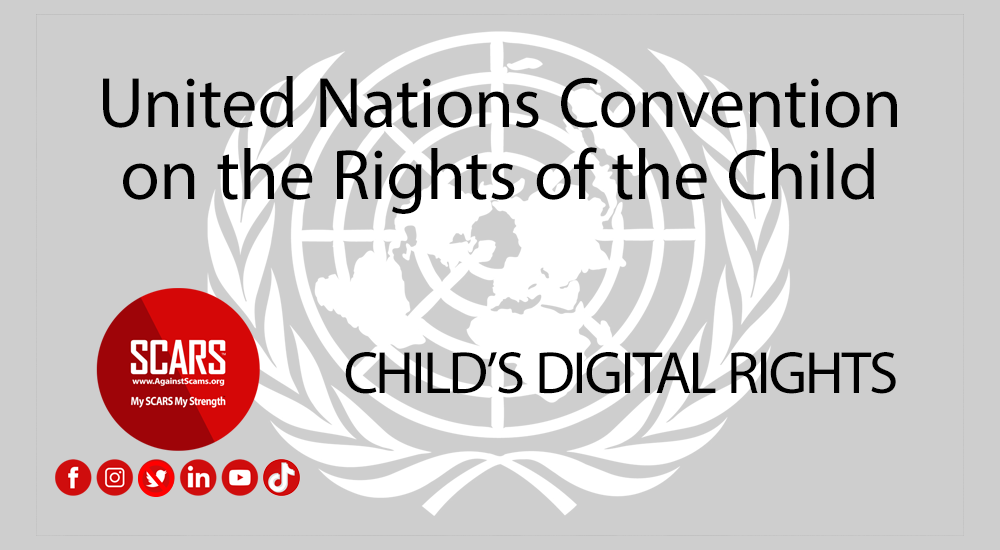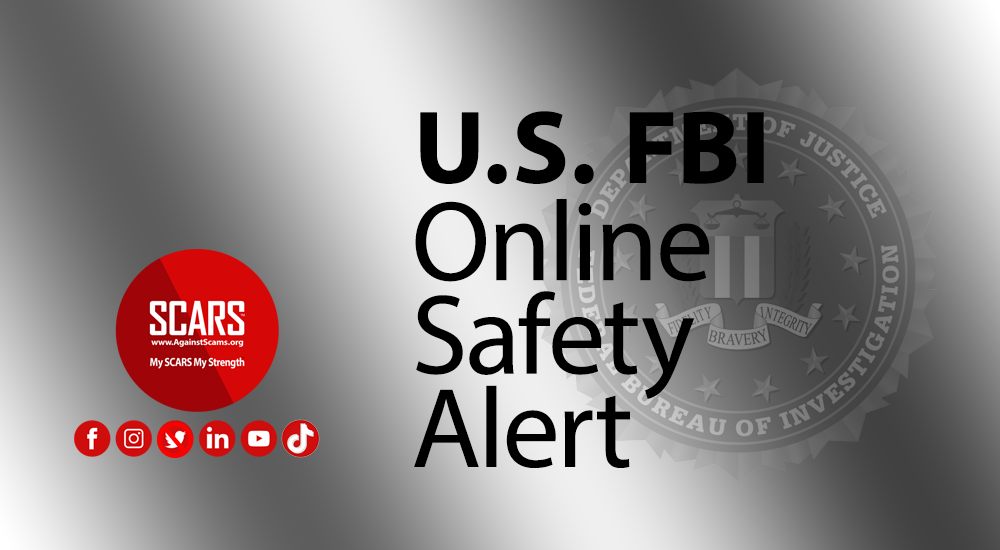
SCARS Institute’s Encyclopedia of Scams™ Published Continuously for 25 Years

FBI Advice On Children’s Online Dangers
Advice on how to keep your family safe online!
United States Attorney’s Office, FBI Warns of Online Dangers
As the world continues to operate in a more virtual environment due to COVID-19 restrictions, Acting United States Attorney Daniel P. Bubar and Christopher R. Derrickson, Acting Special Agent in Charge of the FBI’s Richmond Division are reminding people to continue to be vigilant when it comes to keeping your family safe online.
“The worldwide pandemic caused by COVID-19 has changed the way we interact with our community. Many of our school, work, and social events are now conducted online, making the need to be aware of the threats posed even greater,” the Acting United States Attorney Bubar said today. “Parents need to be aware of who their children are communicating with, what apps they are using, and whether the games they are playing have a messaging or chat function. Predators can use all of these mechanisms to infiltrate our lives. The United States Attorney’s Office and our partners at the FBI are doing our part to keep you safe but we want parents, grandparents, and others to have as much information as possible to stay vigilant and protect their families as well.”
FBI Acting Special Agent in Charge Derrickson urges parents to talk to their kids about the dangers of the internet and what to do if someone approaches them with an inappropriate request.
“Sextortion is not a crime defined by sex, race, education, geography, or a family’s affluence – any child can be a victim of sexual exploitation. The FBI is fully committed to working with our law enforcement partners to educate adults and children, investigate allegations, provide appropriate victim services, and prosecute predators,” Acting Special Agent in Charge Derrickson said today. “Prompt reporting is key in stopping these crimes, capturing the perpetrator, and preventing further victimization. The FBI relies on assistance from the community, especially in these types of sensitive investigations. Please do not be afraid or ashamed to contact authorities or tell a trusted adult to report suspected or actual exploitation.”
According to Acting U.S. Attorney Bubar, it is an unfortunate reality that individuals contact minors online and attempt to extort them, seeking inappropriate pictures or videos.
Last month in federal court in Roanoke, the U.S. Attorney’s Office prosecuted a Roanoke man who had been communicating with an undercover federal agent he believed to be a 12-year-old. Over the course of several months, the defendant used online messaging apps to communicate with the victim, and several other minors, in attempts to convince them to send him nude pictures and videos of themselves.
Acting SAC Derrickson offered some advice on how parents can keep their children safe while navigating the ever-expanding online world:
Advice for Children:
- Be selective about what you share online.
- Be cautious of anyone you meet online for the first time – block/ignore messages from strangers.
- Know that people can pretend to be anything/anyone online. Images can be altered or stolen.
- Be suspicious if you meet someone on one app and they ask you to move to a different platform.
- Know and assume that any content you create online — texts, photos/images, or videos — will be made public, permanently. Nothing “disappears” online, and once sent to you – you have no control over where it goes.
- Be willing to ask for help.
Advice for Adults:
- Maintain active engagement with your children. Open the door and encourage an open and honest conversation about online activity and possible victimization.
- Place limits on internet use.
- Consider shutting down Wi-Fi during overnight hours.
- Review settings on social media and ensure they are set at the strictest level possible.
- Spot check phones and other devices.
- Know what apps are being used.
- Know who is communicating with your child.
- Be aware of what is being downloaded.
- Know passwords to electronic devices.
Most importantly, if you feel you may have been a victim, or have seen something online you believe may be illegal, report it immediately by calling your local police department or contacting the FBI at:
- FBI Tip-Line, 1-800-CALL-FBI (225-5324)
- FBI Online Tipline: https://tips.fbi.gov/
There are also more resources available at fbi.gov/about/community-outreach/safe-online-surfing-sos-program and sos.fbi.gov/en/ - See below for more information about report online crime
PLEASE SHARE OUR ARTICLES WITH YOUR FRIENDS & FAMILY
HELP OTHERS STAY SAFE ONLINE – YOUR KNOWLEDGE CAN MAKE THE DIFFERENCE!
THE NEXT VICTIM MIGHT BE YOUR OWN FAMILY MEMBER OR BEST FRIEND!
By the SCARS™ Editorial Team
Society of Citizens Against Relationship Scams Inc.
A Worldwide Crime Victims Assistance & Crime Prevention Nonprofit Organization Headquartered In Miami Florida USA & Monterrey NL Mexico, with Partners In More Than 60 Countries
To Learn More, Volunteer, or Donate Visit: www.AgainstScams.org
Contact Us: Contact@AgainstScams.org
-/ 30 /-
What do you think about this?
Please share your thoughts in a comment below!
LEAVE A COMMENT?
Recent Comments
On Other Articles
- Arwyn Lautenschlager on Love Bombing And How Romance Scam Victims Are Forced To Feel: “I was love bombed to the point that I would do just about anything for the scammer(s). I was told…” Feb 11, 14:24
- on Dani Daniels (Kira Lee Orsag): Another Scammer’s Favorite: “You provide a valuable service! I wish more people knew about it!” Feb 10, 15:05
- on Danielle Delaunay/Danielle Genevieve – Stolen Identity/Stolen Photos – Impersonation Victim UPDATED 2024: “We highly recommend that you simply turn away form the scam and scammers, and focus on the development of a…” Feb 4, 19:47
- on The Art Of Deception: The Fundamental Principals Of Successful Deceptions – 2024: “I experienced many of the deceptive tactics that romance scammers use. I was told various stories of hardship and why…” Feb 4, 15:27
- on Danielle Delaunay/Danielle Genevieve – Stolen Identity/Stolen Photos – Impersonation Victim UPDATED 2024: “Yes, I’m in that exact situation also. “Danielle” has seriously scammed me for 3 years now. “She” (he) doesn’t know…” Feb 4, 14:58
- on An Essay on Justice and Money Recovery – 2026: “you are so right I accidentally clicked on online justice I signed an agreement for 12k upfront but cd only…” Feb 3, 08:16
- on The SCARS Institute Top 50 Celebrity Impersonation Scams – 2025: “Quora has had visits from scammers pretending to be Keanu Reeves and Paul McCartney in 2025 and 2026.” Jan 27, 17:45
- on Scam Victims Should Limit Their Exposure To Scam News & Scammer Photos: “I used to look at scammers photos all the time; however, I don’t feel the need to do it anymore.…” Jan 26, 23:19
- on After A Scam, No One Can Tell You How You Will React: “This article was very informative, my scams happened 5 years ago; however, l do remember several of those emotions and/or…” Jan 23, 17:17
- on Situational Awareness and How Trauma Makes Scam Victims Less Safe – 2024: “I need to be more observant and I am practicing situational awareness. I’m saving this article to remind me of…” Jan 21, 22:55
ARTICLE META
Important Information for New Scam Victims
- Please visit www.ScamVictimsSupport.org – a SCARS Website for New Scam Victims & Sextortion Victims
- Enroll in FREE SCARS Scam Survivor’s School now at www.SCARSeducation.org
- Please visit www.ScamPsychology.org – to more fully understand the psychological concepts involved in scams and scam victim recovery
If you are looking for local trauma counselors please visit counseling.AgainstScams.org or join SCARS for our counseling/therapy benefit: membership.AgainstScams.org
If you need to speak with someone now, you can dial 988 or find phone numbers for crisis hotlines all around the world here: www.opencounseling.com/suicide-hotlines
A Note About Labeling!
We often use the term ‘scam victim’ in our articles, but this is a convenience to help those searching for information in search engines like Google. It is just a convenience and has no deeper meaning. If you have come through such an experience, YOU are a Survivor! It was not your fault. You are not alone! Axios!
A Question of Trust
At the SCARS Institute, we invite you to do your own research on the topics we speak about and publish, Our team investigates the subject being discussed, especially when it comes to understanding the scam victims-survivors experience. You can do Google searches but in many cases, you will have to wade through scientific papers and studies. However, remember that biases and perspectives matter and influence the outcome. Regardless, we encourage you to explore these topics as thoroughly as you can for your own awareness.
Statement About Victim Blaming
SCARS Institute articles examine different aspects of the scam victim experience, as well as those who may have been secondary victims. This work focuses on understanding victimization through the science of victimology, including common psychological and behavioral responses. The purpose is to help victims and survivors understand why these crimes occurred, reduce shame and self-blame, strengthen recovery programs and victim opportunities, and lower the risk of future victimization.
At times, these discussions may sound uncomfortable, overwhelming, or may be mistaken for blame. They are not. Scam victims are never blamed. Our goal is to explain the mechanisms of deception and the human responses that scammers exploit, and the processes that occur after the scam ends, so victims can better understand what happened to them and why it felt convincing at the time, and what the path looks like going forward.
Articles that address the psychology, neurology, physiology, and other characteristics of scams and the victim experience recognize that all people share cognitive and emotional traits that can be manipulated under the right conditions. These characteristics are not flaws. They are normal human functions that criminals deliberately exploit. Victims typically have little awareness of these mechanisms while a scam is unfolding and a very limited ability to control them. Awareness often comes only after the harm has occurred.
By explaining these processes, these articles help victims make sense of their experiences, understand common post-scam reactions, and identify ways to protect themselves moving forward. This knowledge supports recovery by replacing confusion and self-blame with clarity, context, and self-compassion.
Additional educational material on these topics is available at ScamPsychology.org – ScamsNOW.com and other SCARS Institute websites.
Psychology Disclaimer:
All articles about psychology and the human brain on this website are for information & education only
The information provided in this article is intended for educational and self-help purposes only and should not be construed as a substitute for professional therapy or counseling.
While any self-help techniques outlined herein may be beneficial for scam victims seeking to recover from their experience and move towards recovery, it is important to consult with a qualified mental health professional before initiating any course of action. Each individual’s experience and needs are unique, and what works for one person may not be suitable for another.
Additionally, any approach may not be appropriate for individuals with certain pre-existing mental health conditions or trauma histories. It is advisable to seek guidance from a licensed therapist or counselor who can provide personalized support, guidance, and treatment tailored to your specific needs.
If you are experiencing significant distress or emotional difficulties related to a scam or other traumatic event, please consult your doctor or mental health provider for appropriate care and support.
Also read our SCARS Institute Statement about Professional Care for Scam Victims – click here to go to our ScamsNOW.com website.








![To Be A Scammer? An Overview Of Scammers Fraudsters & Online Con Artists - 2024 [UPDATED] what is a scammer what-is-a-scammer](https://romancescamsnow.com/wp-content/uploads/2021/10/what-is-a-scammer.png)
![New Research Study on Stolen Valor - Military Scams - STUDY NOW COMPLETED [UPDATED] Military Impersonation Research Study New Research Study on Stolen Valor - Military Scams](https://romancescamsnow.com/wp-content/uploads/2022/03/Military-Impersonation-Research-Study.png)







Thank you for your comment. You may receive an email to follow up. We never share your data with marketers.